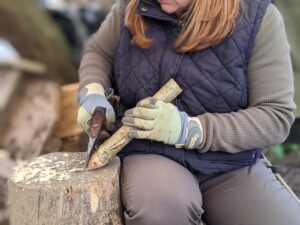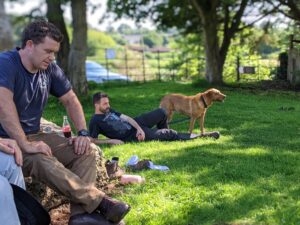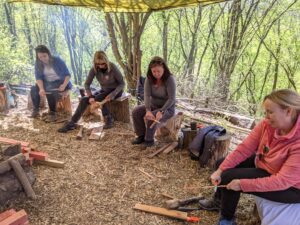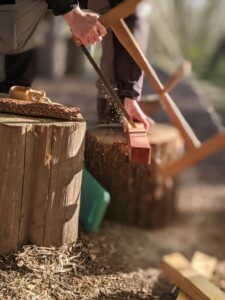The Woodland Warrior Programme – A Tale of Resilience
Across the VPPP portfolios, the Trust has seen some innovative examples of how partner organisations work together to ensure that they deliver a seamless and comprehensive service to their beneficiaries. One of the topics high on the agenda at the moment is resilience and mental wellness among staff, and ensuring that organisations take steps to protect and enhance the mental wellbeing of their workers, particularly when the mental drain on them is high due to the intense work that they deliver.

The Armed Forces Covenant Fund Trust funds a significant number of organisations that support members of our Armed Forces community who are experiencing considerable mental health support needs. Many of the Trust’s funded projects focus on providing a “retreat” where the beneficiary can get away from it all and be able to talk about their experiences in depth in an environment that allows them to share their often quite harrowing life stories. But what happens to those who support those in need? Who cares for those who care?
At the VPPP South West lead and partner forum last month, Woodland Warrior were particularly keen to share with other partners what they have implemented, and the interventions they have introduced to “keep their leaders at the top”. The Trust spoke to Nick and Louise Goldsmith from the Woodland Warrior Programme, about recognising that self-care and mental health support is just as important for their staff as it is for the beneficiaries they support.
“We were very naïve at the beginning because this altruistic, noble intent blinds you. However we were flat out. It’s not just a weekend pursuit, it’s Friday to Sunday, and for us, Monday was completely written off as well”.
Speaking candidly, Nick told the Trust that recognising the beginning of burn-out and dealing with it effectively was absolutely crucial to the mental wellness of himself and his staff. Putting robust coping strategies in place and being accepting that they are necessary has kept this organisation healthy and thriving and able to support its beneficiaries to the best of its ability.

The project was approached via social media by James, an NHS mental health professional, who also supports the aims of the Woodland Warrior programme. After reading about the support that Woodland Warrior provide their beneficiaries, he in turn offered his assistance to Nick and his team. James’ input provides a much-needed mental health support structure to enable staff to identify their own mental health needs and keep them healthy. One of the most important things that James provides is a session to all Woodland Warrior staff following their return from a weekend event which crucially helps them remain grounded in all that they do.
Nick and Louise also outlined other resilience measures that they deploy in order to keep their staff mentally well and thus able to help those in need.
“Resilience doesn’t have to be a heavy thing in terms of your environment. Put simply, you need to give yourself breathing space”

Keeping numbers small is key to allow this to take place, each Woodland Warrior weekend programme is only open to six beneficiaries at a time. Doing this allows staff to be able to offer their time more effectively, have breaks, and allows the proceedings of the weekend to be supervised by other staff, so staff can identify when another might be in need of support or need some time out. Keeping staff talking to each other is also a key part of Nick and Louise’s staff wellness strategy, and also a much needed debrief at the end of each weekend event, where staff are able to share their feelings, concerns and opinions.

The organisation is also recognising that since its inception in 2016, it has rarely had a break from hosting weekend events, so they have recognised that their support structure needs to change in order to recognise the needs of the staff and prevent burn-out. Going forward, Nick and Louise have devised more one-day courses that will be able to help more beneficiaries, which will be effective in terms of delivering the care and support their beneficiaries expect, but without the mental drain on staff of delivering intense weekend experiences.
For Louise and Nick, their commitment to keeping their staff well and “keeping their leaders at the top” where they need to be is paying dividends. Staff feel supported in a holistic way and are able to deliver the support effectively where it is still so much needed, however they are also able to feel supported in the way it is delivered.